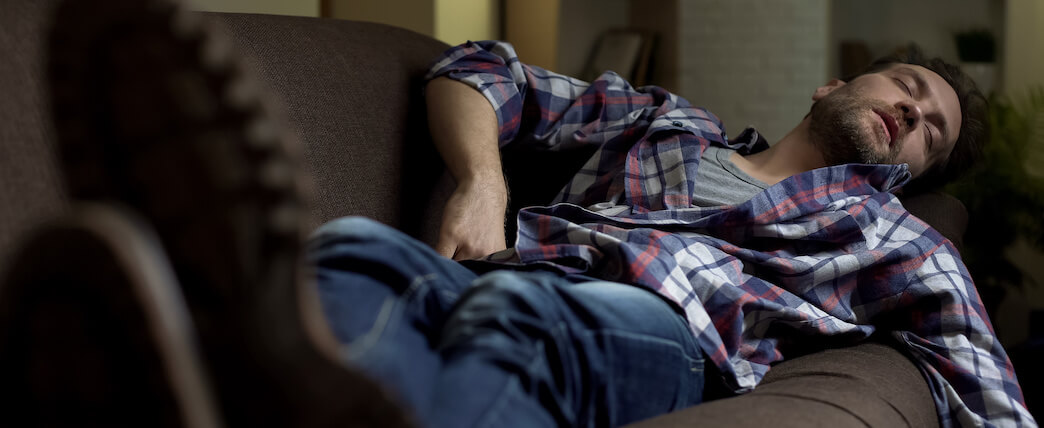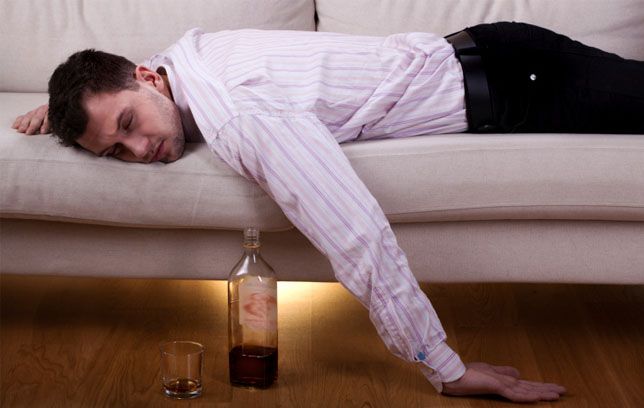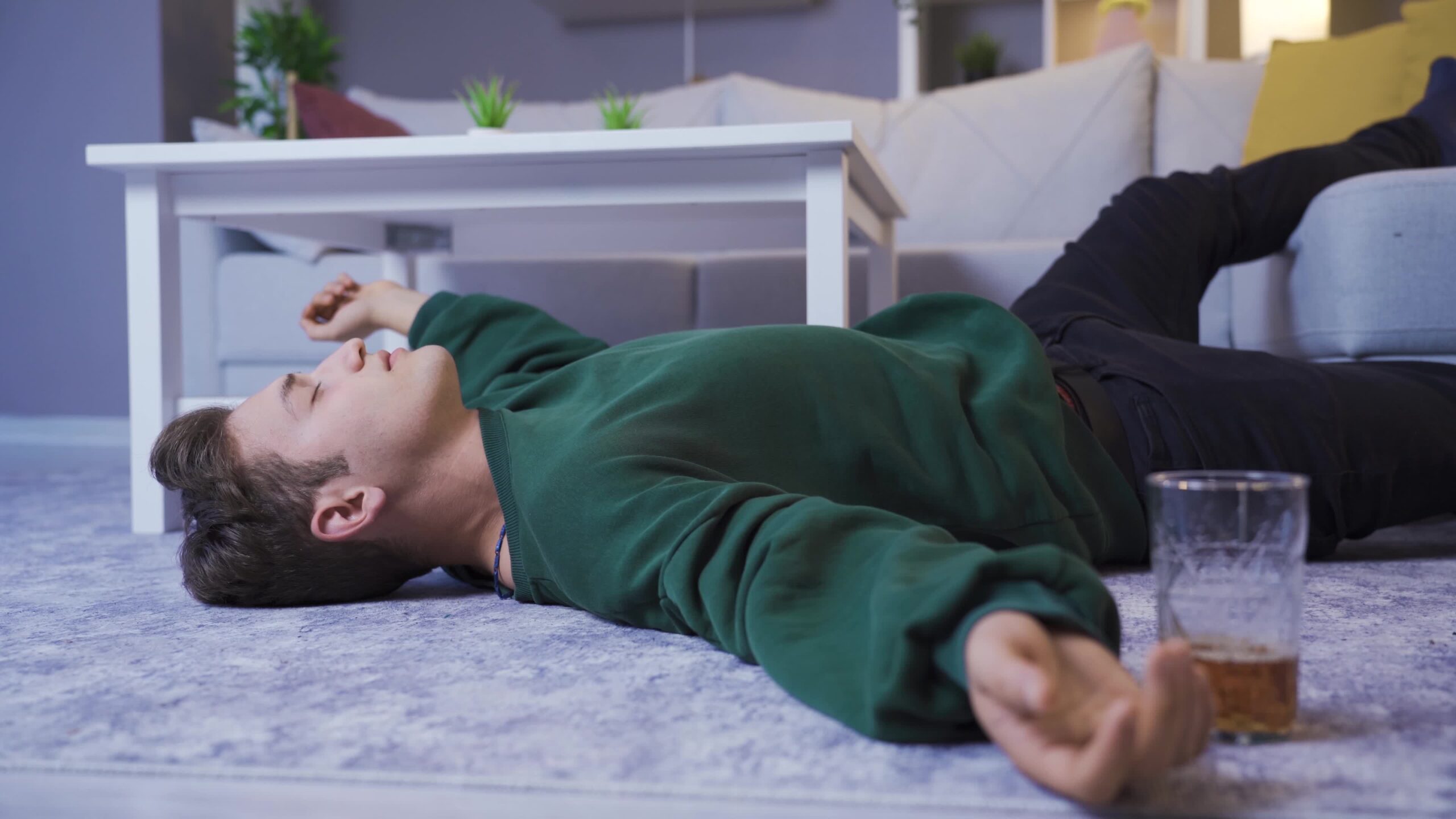When someone passes out drunk, their body is intolerant of the level of alcohol they’ve consumed. The heart rate decreases, breathing is slowed, and blood pressure lowers when drinking because liquor is a depressant. With more than the individual can physically handle, the brain is overly depressed, resulting in them passing out.
That amount is excessive and is a reason for friends to be concerned. Once someone passes out from too much alcohol, trying to get them to wake up is vital. If the person won’t, it’s essential to contact emergency services. People can die from alcohol poisoning, with the Center for Disease Control reporting that “six people die each day from the poisoning.”
When reaching out for help, it’s an attempt at saving your friend’s life. When stroking the shoulders or calling the person’s name is not effective at raising the person from sleep, try using “knuckles on the sternum or pinching the earlobes” to create slight pain as a way to get a response.
If they remain asleep, the individual may be unconscious, putting them at risk for fatality. Further symptoms of alcohol overdose include breathing over ten seconds for every two breaths, seizure, lowered body temp, throwing up, pale skin, confusion, and clammy skin. The person should be placed on their side to avoid choking before reaching out to 911.
Table of Contents
ToggleAlcohol Overdose And How To React
The Centers for Disease Control and Prevention or CDC indicates roughly 2000 people, equating to approximately six each day, die from alcohol overdose annually. A majority of the drinkers are male, and the age frame ranges between “35 and 65.”
When these individuals drink heavily at a fast rate, it can lead to overdose with symptoms including unconsciousness with the potential for fatality. As a friend to the individual, it’s essential to stay with the person, attempt to wake them, place them on their side, and contact emergency services for life-saving techniques.
It’s important to learn the symptoms of alcohol poisoning. Hence, you distinguish between someone passing out and sleeping off being drunk and an individual who has gone unconscious from overdosing. The most prominent symptoms include the following:
- Unconscious vomiting without waking before, during, or after
- Seizure
- The risk of choking due to a lack of gag reflex
- Unable to wake the individual even when inducing pain
- Hypothermia (exceptionally low body temp / blue-hued or clammy skin
- Irregular breaths at roughly 10 seconds between every two
It doesn’t mean the person will have all the symptoms for a severe risk. A person unable to be raised or an unconscious individual is a risk for fatality.
What Is The Reason For Alcohol Overdose?

When consuming alcohol in heavy amounts that make its way into the bloodstream, the brain function diminishes for life-supporting symptoms that eventually start to shut down depending on the overdose. That means when a friend passes out from drinking, it could be more serious than sleeping off a little too much to drink.
If this person overindulged, the experience could have led to acute alcohol overdose, putting them into a coma with the possibility of fatality if immediate action is not taken. Heavy and fast ingestion of alcohol affects the concentrations of fluid in the body, interfering with nutrients, electrolytes, and other essentials, creating an imbalance.
The amount a person drinks leading to overdose will range for each individual and is related to many variables, including the following:
- If the person had something to eat or is drinking on an empty stomach
- Their alcohol tolerance
- The alcohol consumption and how quickly
- Physical health conditioning
- Body size/weight
When a person drinks excessively or binges on alcohol, the risk of overdose or poisoning is higher. For men, this involves “five or more alcoholic drinks in a two-hour time frame,” and for women, “four or more alcoholic beverages within a two-hour time frame.”
How can you tell if a friend has a problem with drinking excessively with the potential for overdose? Here are the signs.
- They try to hide the amount they drink or feel guilty about their consumption
- They are exceptionally fatigued or hungover, often from evenings out
- They regret their behavior after drinking
- They had more to drink than anticipated while out / greater than the standards
- They passed out
- They regularly consume excessive amounts at social gatherings or on weekends
Even when engaging in binge drinking only occasionally, there will be adverse effects on wellness.
Why Do People Drink Too Much?
The statistics indicate that around “one adult in every six within the US engage in binge drinking regularly, usually on weekends.” Many variables are responsible for excessive alcohol use, including the following factors.
- Cravings once a dependence begins to develop
- Stress-induced binges in an effort to reestablish a sense of calm
- Feeling peer pressure in social situations, trying to fit in and keep up with others
- Drinking as a form of entertainment when bored
- Consuming alcohol in large amounts quickly to cope with anxiety or other mental unwellness
How To Help A Friend Manage Alcohol Consumption

When a friend has a problem with binge drinking or overdoses on alcohol, and you’re concerned, there are things to help curb the behavior. In your effort, you can try the following:
- Plan with your friend when going out by setting limits upfront to the amounts each of you will drink and decide you’ll leave after having that amount. When holding each other accountable, the support will lead to lower consumption and goals achieved.
- Instead of ordering the largest size, encourage your friend to order the small size with less alcohol and “nurse” the drink for longer instead of drinking fast, ordering one right after the other.
- Suggest that your friend seek a consult with their medical provider even if heavy alcohol intake is only an occasional occurrence. This can grow into a more frequent habit and have adverse health effects. A doctor can recommend interventions and medications to treat the issue sooner rather than later.
Conclusion
When a friend passes out from drinking alcohol, it’s a serious incident that needs immediate attention. The first step is to try to wake the individual and keep them awake to sober them up.
If you can’t get them to wake up, they likely have gone unconscious with the need for emergency services.
Whether this is a one-time binge or the individual regularly consumes alcohol excessively, it’s essential to encourage the person to seek a consult with a medical provider for guidance on the usage.
There can be severe health repercussions from alcohol abuse. The more someone drinks, the more they want to. When a friend steps in to help curb usage, it can stop the behavior before it gets out of control.

I am a passionate beer connoisseur with a deep appreciation for the art and science of brewing. With years of experience tasting and evaluating various beers, I love to share my opinions and insights with others and I am always eager to engage in lively discussions about my favorite beverage.
















